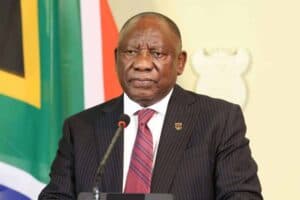South Africans are still in the dark about the immediate future of a Government of National Unity. Here's what to know.

Following the outcome of an 11-hour special meeting of the African National Congress (ANC) National Executive Committee (NEC) on Thursday, President Cyril Ramaphosa announced that the ruling party will seek to form a Government of National Unity (GNU) that will include multiple parties.
While the ANC remains the largest party in South Africa, winning 40.2% of the vote in the 29 May general election, it now has only 159 seats, 42 short of a majority, in the 400-seat National Assembly.
The president said the ANC believes to establish a GNU would be the “best way forward” to overcome the political deadlock of a hung Parliament, as well as the party’s hung provinces.
Government of National Unity one of three options
According to the Daily Maverick, a GNU is one of three of the “safe” power-sharing options that has been on the table all week. The other two being:
- A coalition agreement with the Democratic Alliance (DA) and Inkatha Freedom Party (IFP); or
- A looser confidence-and-supply agreement with the DA and IFP.
If the GNU does not come to fruition, another middle-of-the-road strategy would be for Ramaphosa to seek the position of president without a coalition agreement in place.
Mandela did it first
The GNU is a model first explored in South Africa in 1994 when then president Nelson Mandela formed his first government, consisting of the ANC, the National Party (NP) and IFP.
The move was aimed at fostering unity and to navigate the period of instability following the first democratic election. Ramaphosa himself played a significant role in the formation of 1994’s GNU.
After the adoption of a new Constitution in 1996, the NP exited the agreement. It was considered a positive move towards the stability of the country emerging from apartheid.

Government of National Unity in principle and practice
In the ANC’s proposal for a broad-based government of national unity, many parties would have representation, with cabinet ministers picked from some of the various parties.
In his announcement, Ramaphosa mentioned that the ANC has had “constructive discussions” with the Economic Freedom Fighters (EFF), IFP, DA, National Freedom Party (NFP) and the Patriotic Alliance (PA).
What he did not mention, however, is that some of these parties, such as the EFF and uMkhonto weSizwe (MK) Party, hold radically different views on the Constitution, the rule of law and fiscal management.

The Marxist EFF wants to change the laws on land redistribution and nationalise the mines, as well as the South African Reserve Bank.
In turn, the left-wing populist MK party intends to change South Africa’s legal system and pardon its leader, former president Jacob Zuma, which would allow him to take up a seat in Parliament.
No room for ‘chaos, instability and division’
Ramaphosa has pointed out that the ANC would isolate those who sought “to cause chaos and instability and division,” a thinly veiled warning to Zuma and the MK party, who have rejected the election results.

To add to the ANC’s GNU headache, DA leader John Steenhuisen has ruled out working with either the EFF or MK party. In turn, Zuma’s party has said it will only work with the ANC if Ramaphosa is replaced as the party’s president.
ALSO READ: ‘Perilous time’: Helen Zille, Tony Leon to lead DA coalition team, says Steenhuisen
Political analysts and public commentators weigh in
Director of the University of London’s School of Oriental and African Studies (SOAS), Professor Adam Habib, told Newzroom Afrika reckons that the Government of National Unity “makes the most sense”.
This as it is very difficult for the ANC to partner with the DA because of the politics of race in South Africa.
“It cannot just be an abstract concept based on political rhetoric,” Habib said
He added that it was paramount for the government to address social and economical inequality which feeds populist politics.
The former Wits University vice-chancellor warned that the stability of the Government of National Unity will be determined by “who comes in” and whether there will be “decisive leadership”.
According to him, parties like the EFF and MK party are “disruptive” forces, and he would not be averse to them not being part of the GNU.
“The EFF is a fascist party, it is violence-prone and acts like children on a playground in coalitions,” he said.
DA’s red line under EFF
Peter Attard Montalto, managing director of financial consultancy Krutham, told the Financial Times that remains firm in its decision not to work in any government with the EFF, “we might get stuck with an unsavoury outcome” as financial markets will take a heavy hit.
Attard Montalto added that Ramaphosa’s preference for a unity government was an attempt to force a “national dialogue to help make decisions his party cannot make”.
NOW READ: Government of national unity warning: ANC’s plan ‘harder to achieve and maintain’






